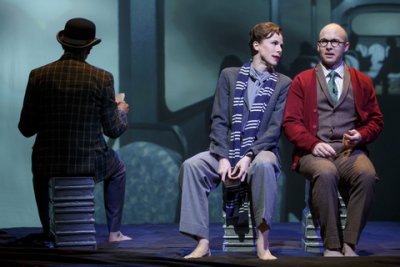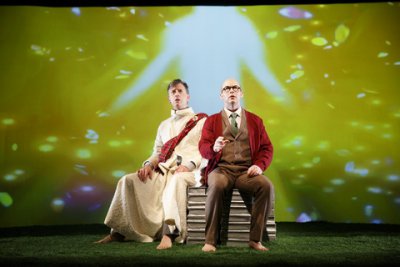The Great Divorce
C.S. Lewis’ famous theological allegory receives an engrossing and visually arresting stage presentation.

Michael Frederic, Christa Scott-Reed and Joel Rainwater in a scene from “The Great Divorce” (Photo credit: Joan Marcus)
[avatar user=”Victor Gluck” size=”96″ align=”left” ] Victor Gluck, Editor-in-Chief[/avatar]
[Note: This is a review of the previous 2015 production with the same production team and one of the same actors. The current production is updated and includes four actors instead of three as before.]
While C.S. Lewis’ famous theological allegory, The Great Divorce, is written as a series of conversations, you might not expect that it would be suitable for stage dramatization as a religious treatise. However, the Max McLean and Brian Watkins adaptation for Fellowship for Performing Arts turns this into a highly provocative and theatrical evening. Under the assured direction of Bill Castellino, three extremely talented actors (Christa Scott-Reed, Joel Rainwater, and Michael Frederic) play 19 characters among them, making them distinct and fully dimensional. The remarkable projections by Jeffrey Cady and the evocative original music and sound design by John Gromada make this a treat for the ear and eye as well as the mind.
The title of C.S. Lewis’ W.W. II novel is a reference to William Blake’s poem “The Marriage of Heaven and Hell,” while the ironically titled The Great Divorce recounts a trip from Hell to Heaven. The narrator (played by Rainwater) falls asleep in his library and finds himself in a “Grey Town” (Hell or Purgatory) on a rainy day. He eventually finds himself on the line for a bus with citizens of the Grey Town who are also waiting. He witnesses a husband and wife who have a very vocal fight and a another man strike a woman. When the bus finally departs, the Narrator meets a Poet who feels superior to most people and a Man in a Bowler Hat who is beset by the sin of Greed, hoping to find something in Heaven to sell back in Hell.
When the bus finally arrives at its destination, they find they are in a huge green meadow on the outskirts of Heaven. All discover that they are ghosts so insubstantial that the solid grass hurts their feet. Radiant spirits, solid bright people who have come from the mountain in the distance approach each of the passengers and invite them to join in the New World. The Narrator witnesses each of the encounters and one by one the passengers return to the bus for the journey back, rejecting Heaven.

Joel Rainwater, Christa Scott-Reed and Michael Frederic in a scene from “The Great Divorce” (Photo credit: Joan Marcus)
The Boss Ghost is insulted that such a minor employee of his has come for him. The Artist Ghost is only concerned with Reputation and Fame which have no meaning here. The Man with the Bowler Hat attempts to pick up one of the large, luscious apples that litter the ground to take back with him but finds he can’t lift it. A vain, possessive wife is refused her request to see her husband unless she gives up her Self-love. A Hardbitten Ghost is so cynical that he believes that Heaven is all a sham.
The Narrator then meets the Spirit of Scottish author George MacDonald who becomes his Virgil to the narrator’s Dante, guiding him through the ways of Heaven. Together they witness a Grumbling Ghost not ready to think of any but her complaints and a Mother Ghost whose Selfishness had destroyed her son. They see a simple woman honored as “one of the great ones” for her Compassion and Love of others. Finally, a Ghost with a Lizard arrives representing his Lust and is persuaded by his Spirit to give it up. MacDonald offers the Narrator the choice of eternal death or eternal life. Is it too late?
While each of the encounters are provocative, the play has a cumulative effect, and leaves much to think about. If anything, in this adaptation the scenes are too short, not giving the viewer time to think about the meaning of each scene. The ever changing and colorful projections on Kelly James Tighe’s unit set turn the stage into many locales, complemented by Michael Gilliam’s lighting design. Scott-Reed and Frederic playing all but one of the Ghosts and all of the Spirits have a great many quick changes of Nicole Wee’s costumes which immediately define the different characters.
The play would not be so engrossing if it were not for the skills of the threesome who deftly and quickly create the 19 characters we meet in the course of 90 minutes. Playing nine characters, Christa Scott-Reed runs the gamut from the conceited Poet to the famous Artist to the possessive Mother, as well as the sweet-tempered Spirit of the Boss Man and the Fiery Spirit who convinces the man to give up his lizard. Playing eight characters Michael Frederic alternates between sinful characters (the Bullying Ghost, the Boss Ghost, the Hardbitten Ghost) and the avuncular MacDonald as well as the placid Spirits for the Artist and the Mother Ghosts. While Rainwater is mainly an observer as the Narrator is his memorable as the addicted Man with the Lizard who begs to be let off until tomorrow.
Whether you are familiar with the adult philosophy of C.S. Lewis or just The Chronicles of Narnia, The Great Divorce is a very theatrical staging of some deeply provocative questions. After you have forgotten the spectacular visuals, the play will leave you with much serious matter to think about.
The Great Divorce (return engagement December 12- 29, 2019)
Fellowship for Performing Arts
Theatre Three at Theatre Row, 410 W. 42nd Street, in Manhattan
For tickets, call 212-239-6200 or visit http://www.telecharge.com
Running time: 90 minutes with no intermission







Leave a comment